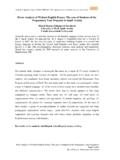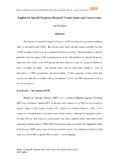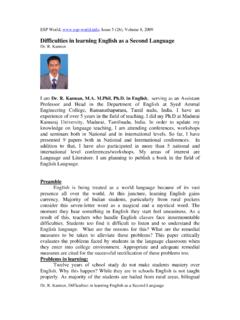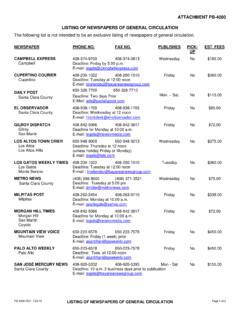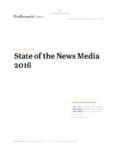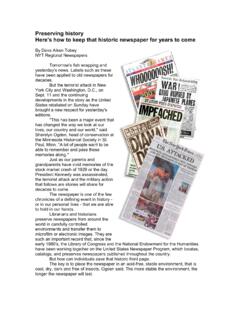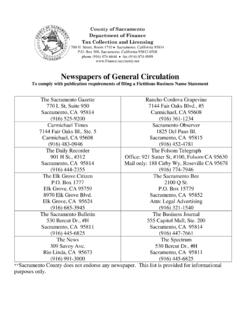Transcription of REPORTING VERBS AND STANCE IN FRONT PAGE STORIES OF ...
1 English for Specific Purposes World, ISSN 1682-3257, , Issue 40, vol. 14, 2013 REPORTING VERBS AND STANCE IN FRONT PAGE STORIES OF ghanaian NEWSPAPERS. Nancy Boahemaa Nkansah 1 REPORTING VERBS AND STANCE IN FRONT PAGE STORIES OF ghanaian NEWSPAPERS Nancy Boahemaa Nkansah Department of English University of Cape Coast Cape Coast, Ghana. ABSTRACT Newspaper reportage has been a focus of research among scholars in Media Studies and Applied Linguistics. However, less attention has been given to newspaper REPORTING in the ghanaian setting. This paper, therefore, examines the use of REPORTING VERBS in FRONT page STORIES of ghanaian newspapers: Daily Graphic and the ghanaian Times . Eighty newspapers were randomly selected from the Daily Graphic and ghanaian Times and analysed using qualitative content analysis. The analysis pointed to two key findings. It was realized that out of the REPORTING VERBS used, REPORTING VERBS which showed speaker s STANCE were more frequent than REPORTING VERBS which showed writer s STANCE .
2 These findings have implications for the understanding of REPORTING VERBS and STANCE and further research. Keywords: Newspapers, STANCE , REPORTING VERBS , Ghana 1. Introduction Sinclair (1994) explains that one of the special features of human language is that it can talk about itself. REPORTING is an important linguistic phenomenon in both written and spoken discourse. An aspect of written discourse in which REPORTING is most dominant is in newspaper English for Specific Purposes World, ISSN 1682-3257, , Issue 40, vol. 14, 2013 REPORTING VERBS AND STANCE IN FRONT PAGE STORIES OF ghanaian NEWSPAPERS. Nancy Boahemaa Nkansah 2 reportage. REPORTING VERBS are the most important feature of a REPORTING clause and occur in most REPORTING sentences. Newspapers as a written discourse have gradually and ultimately become an integral part of today s society by providing primary and secondary information.
3 Newspapers have provided vast information for the people to discern and a platform for oral discourse. REPORTING is a feature that characterizes newspapers. It is for this reason that this study seeks to do an analysis of selected ghanaian newspapers specifically, the Daily Graphic and The ghanaian Times . It is against this background that the present study seeks to do an analysis of REPORTING VERBS in FRONT page STORIES of selected ghanaian newspapers. 2. Statement of the problem REPORTING is a feature of newspapers - a news genre. REPORTING as a skill has an effect on the interpretation and understanding of an utterance. Taking into consideration the features of REPORTING , REPORTING VERBS have been the focus of many researchers. Areas such as categories of REPORTING VERBS in academic writings have been of great interest to researchers. However, as far as the use of REPORTING VERBS in newspapers in the ghanaian setting is concerned, relatively few studies do exists.
4 It is against this backdrop that this study seeks to investigate the use of REPORTING VERBS in FRONT page STORIES of selected ghanaian newspapers. This study attempts to find out the how REPORTING VERBS employed in newspapers show stances in FRONT page STORIES of the Daily Graphic and The ghanaian Times newspapers. 3. Research questions The objectives of this paper are to seek answers to the following research questions: 1. What is the frequency distribution of REPORTING VERBS in the FRONT pages of the selected newspapers? English for Specific Purposes World, ISSN 1682-3257, , Issue 40, vol. 14, 2013 REPORTING VERBS AND STANCE IN FRONT PAGE STORIES OF ghanaian NEWSPAPERS. Nancy Boahemaa Nkansah 3 2. How are REPORTING VERBS employed to show STANCE in the FRONT pages of selected ghanaian newspapers? 4. Conceptual framework Reported speech shows the structure and feature of communication and basically, reflects the interactive aspect of language (Sakita, 2002).
5 Greenbaum (1996) states that there are two major categories of REPORTING the words of a speaker or writer. These are the direct and indirect reported speech. REPORTING is introduced by a REPORTING verb; however, REPORTING verb is only one sign of REPORTING (Swales, 1990). Thompson (1996: 506) views reported speech to include any stretch of language where the speaker or writer signal in some way that another voice is entering the text, in however muffled or ambiguous fashion . Voloshinov (1973) is right in arguing that any attempt to treat indirect speech solely in terms of mechanical transformation is bound to distort the picture. In REPORTING , whether direct or indirect reported speeches is introduced with a REPORTING clause, which comprises the subject and REPORTING verb. The accessibility to direct news sources is important in making a newspaper report objective and reliable. These sources of news reports appear as the subjects of REPORTING VERBS in REPORTING .
6 The range of VERBS used is wider in written dialogue since they provide additional information to the words being reported such as voice quality, attitude and manner of speaking of characters which may be imaginary or real (Downing and Locke 2006). It is worth mentioning that newspapers FRONT page news is very important and fulfil several functions. They attract readers, reinforce the newspaper s identity through easily recognizable features and demonstrate clearly what the newspaper s attitude is towards the news of the day. It also shows that a particular edition of newspaper contains certain STORIES . FRONT page STORIES can be categorized into lead and secondary lead STORIES . A lead story is one that has been chosen as being of most interest to most readers while a secondary lead story is English for Specific Purposes World, ISSN 1682-3257, , Issue 40, vol. 14, 2013 REPORTING VERBS AND STANCE IN FRONT PAGE STORIES OF ghanaian NEWSPAPERS.
7 Nancy Boahemaa Nkansah 4 still an important story but less than the lead story ( One of the features of newspapers which also manifest in FRONT page STORIES is the use of REPORTING VERBS . 5. Previous studies on REPORTING VERBS in newspapers. REPORTING VERBS have been a subject of research by scholars from many perspectives. This section focuses on the study of REPORTING VERBS in newspapers. The choice and semantic implications of REPORTING VERBS in academic writing has been the focus of researchers: Thompson and Ye (1991), Thomas and Hawes (1994), Graney (1994), Hyland (1999), Williams (2004), Charles (2006), Malstrom (2008), Zhang (2008), Dontcheva-Navratilova (2008), Clugston (2008), Miller and Vellaris (2009), Coelho (2009), Bolch (2009) and Hampton (2010). However, relatively few studies exist on REPORTING VERBS used in Newspaper reportage. Based on her studies of The Time and Wall Street Journals, Bergler (1991) states that there are two levels in newspaper articles: the pure information and the meta information.)
8 The meta information embeds the pure information within a perspective by the use of a REPORTING verb. She establishes that the REPORTING verb adds important information about the manner of the original utterance, the preciseness of the quote and the temporal relationship between the reported and REPORTING clause. It also carries a varying amount of information regarding time, manner and factivity or reliability of the utterance. In addition, the source of the original information provides information about the reliability or credibility of the pure information. In his study on the contrastive analysis of discourse representation in American and Japanese newspaper reports, Yamashita (1998) divides the representing VERBS into REPORTING VERBS , mental, manner- of -speaking and speech act VERBS . REPORTING VERBS give a neutral evaluation of represented discourse. It is not controlled by the reporter but is presented to the English for Specific Purposes World, ISSN 1682-3257, , Issue 40, vol.
9 14, 2013 REPORTING VERBS AND STANCE IN FRONT PAGE STORIES OF ghanaian NEWSPAPERS. Nancy Boahemaa Nkansah 5 reader objectively. Mental VERBS present the internal states of the subject to the reader. Manner-of speaking VERBS present physical characteristics of the represented discourse to the reader. Speech act VERBS give illocutionary force to the represented discourse by the reporter. He emphasizes that the use of REPORTING VERBS is predominant in Japanese and American newspaper reports as compared to the speech act VERBS , manner-of speaking VERBS and mental VERBS . Floyd (2000), studies on REPORTING VERBS and bias in the press. He shows that although news reports aim at neutrality, the choice of REPORTING VERBS show the underlining preferences of journalists. In his study to find out how REPORTING VERBS are used to present two sides in an international conflict, he mentions that REPORTING VERBS show the reporters attitude towards the speaker.
10 The way different people are reported using different REPORTING VERBS influences the opinion of readers towards them. Generally, some REPORTING VERBS are favourable to the speakers reported. The REPORTING VERBS which are considered favourable have some positive connotations or indicate that there is some truth in the reports. These include reiterate, repeat, appeal, disclose, reveal, divulge, confirm, explain, say, tell, announce, points out, spell out and state. Usually, these REPORTING VERBS are used to reports words of elites people, British and American sources. However, unfavourable REPORTING VERBS such as allege and claim are used to report the other side, specifically, the Iraqis. Alternatively, Murphy (2005) investigates the markers of attribution in opinion articles English and Italian newspapers. In his research, six REPORTING attitude groups are established.

